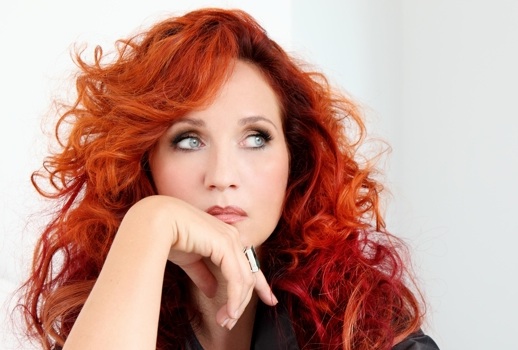
The Gürzenich Orchestra, conducted by Gerrit Priessnitz, sat on stage, with the chorus in colorful ball gowns and evening dress standing or waltzing merrily on a platform right behind it. The pit served as a prison. That was it, except for a sofa for the first act, and a desk for the melodrama in act three. Fortunately, not a music stand in sight. The dialogues were fast, funny, and razor sharp. For the party scene three enormous chandeliers descended on the stage—just enough to set the tone.
Priessnitz has worked at the Volksoper in Vienna for years, so he definitely knows how this music should go. For the party scene he had chosen the Tritsch-Tratsch-Polka, which, like the overture, went particularly well. Priessnitz never rushed, and he paid particular attention to the singers, who had to sing in front of a huge orchestra in n hall with bad acoustics all night.
The main attraction of this Fledermaus was Simone Kermes. She has the technique, and the energy a great Rosalinde needs. In addition, her voice happens to be strikingly beautiful, with enough warmth to make you actually care for the character. From the moment she stepped on stage in one of those baroque can-can dresses, later replaced by a stunning pink and mauve one, covered in glitter, with matching spiked heeled diamante ankle boots, she remained the center of attention all night long. She’s a dangerous Rosalinde, even without the lava-red hair, but an endearing one as well.
Kermes literally danced through most of her arias and ensembles, which made her even more fun to watch. She tossed off her lines with a panache and a lightness removed exactly far enough from the heavy-handed operatic style Strauss himself disliked so much in this work Her “Czardas” was phenomenal, with fearless coloratura, surprising variations in tempo, and a few added embellishments, it sounded even more seductive and exotic than usual. It was certainly the most individual interpretation of the aria I have ever heard. The ovations afterwards just would not end, even with shouts to repeat it!
Her husband was played by the handsome Bo Skovhus, who matched Kermes’ energy. He did sound a little too gruff at times in this impossible part for a baritone. He did sing very stylishly, though, and like Kermes, made you care about the character. In the watch duet he and she were perfectly matched.
Adele was played by local favorite Claudia Rohrbach. Though she is starting to outgrow the sexy French maid outfits, vocally everything still came out as perfect and light as a summer breeze. Her third act aria was brilliantly sung, and brought down the house, just as it should. Ready to take over from Rohrbach whenever she retires the part, young Cologne ensemble member Gloria Rehm impressed as Ida, doing as much as one can do with the part before becoming a nuisance.
The Orlovsky was a little pale in comparison, and somewhat lacking in flair. Katrin Wundsam, nevertheless, sang the part very well. The way her light mezzo launched the great ensemble in act two made up for any lack of characterization elsewhere. Since this was her debut in the role, I am sure more experience will turn her into a fine Orlovsky before long.
Falke was sung by the elegant Miljenko Turk, another outstanding Cologne regular who is now making a great career elsewhere too. Alfred was done to perfection by Mirko Roschkowski, and there was an excellent Dr. Blind from Ralf Rachbauer.
Kammersänger Ulrich Hielscher, a Cologne ensemble member for over 35 years now, was an amusing Frank, with still more than plenty enough voice left for the part. His antics in act 3, with the amusing Frosch of Burghard Braun, made the audience roar with laughter, including the children. This was also the moment for jokes about local politics, but the Leslie Nielsen bumbling of Hielscher, and the physical comedy of Braun were much appreciated by the non-locals as well, who had shown up in large numbers to cheer on diva Kermes in one of her all too rare operetta outings.


